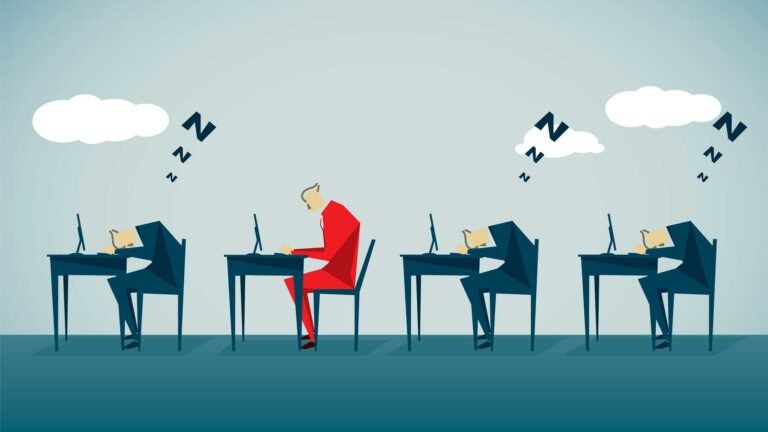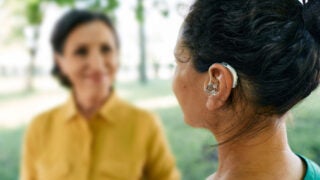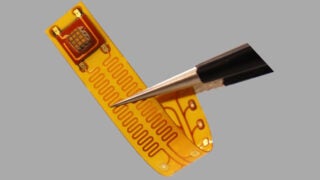
Want to maximize your cram session? Consider getting more sleep, avoiding junk food and even trying meditation, according to USC experts. (Illustration/iStock)
As final exams approach, here are things you can do to make it through in top shape
USC experts have advice — some of it common sense, some surprising — that will help you conquer the week ahead or any time of stress
All-nighters, caffeine, junk food — these are all just part of finals week, right?
Maybe not. And ironically, those unhealthy choices can actually make it harder to concentrate or perform well on that test or paper.
USC News got some tips from experts — from sleep doctors to nutritionists — to find out the best ways to prepare for finals, without putting your mind and body through the wringer.
Sleep
Millennials get about six to seven hours of sleep each night — but during finals week, that can drop to just a few hours, according to Raj Dasgupta of the Keck School of Medicine of USC.
When it comes to test-taking, “people who are sleep-deprived have a greater level of inaccuracy,” he said. Along with that, their decision-making is impaired and so is their memory.
“Obviously, when you’re stressed out for a test, the worst thing to do is pull an all-nighter,” he said, noting sleep helps rejuvenate the mind and consolidate memory.
His advice is to plan ahead. Pick a consistent wake time and a bedtime — and stick to them.
Be mindful
Anxiety is a big part of the decisions students make during finals week — decisions like grabbing junk food or skipping sleep.
Finding a way to be present — not worrying about the long-term ramifications of a grade, paper or final — is key to managing stress, said Dave Baron, a professor of clinical psychiatry at the Keck School of Medicine.
But that does sound easier said than done: You can’t expect to shut off your thoughts, but you can slow things down with breathing exercises, he said. Sometimes he has patients visualize the mind as a dial and then just turn it back.
Instead of allowing the brain to control you with all these anxiety-provoking thoughts, say ‘No, I’m taking control.’
Dave Baron
“Instead of allowing the brain to control you with all these anxiety-provoking thoughts, say ‘No, I’m taking control,’” he said. “‘I’m going to focus on my nice easy breathing, air filling my lungs, my body feeling more relaxed, more comfortable.’”
Plus, your anxiety could backfire — not letting all that studying stick. “We know anxiety in general takes away from our ability to function at our highest levels, both physically and cognitively,” he said.
You know when you’re taking a test and you know the answer, but you can’t think of it? Then you walk out of the exam and — bam! You remember. Baron said that’s a perfect example of how anxiety inhibits the brain.
Starting a consistent breathing practice when you’re not anxious can be helpful, too, so you’re prepared when stress hits, he said.
And how about those meditation apps? “The one [approach] that’s best is the one that works for you.”
Exercise
Finding a way to fit in exercise could help you ace that test — and work off any pre-finals jitters, said Ian Culbertson, who teaches a USC course in “Stress Management for Healthy Living.”
Blood flowing to the brain increases focus, and studies show that people who regularly exercise have more dopamine released in the brain, which causes the sense of pleasure or happiness, he said. In turn, that creates more productive and creative workers.
Culbertson recommends finding a way to get your heart rate up that is comfortable and easy for you — maybe it’s hitting the bleachers at the stadium or running up and down the stairs in the parking structure.
Getting your heart rate down also has benefits — like doing yoga, meditating or going for a walk in the rose garden. When it comes to walking, he said there’s one caveat — make sure it’s about enjoying the walk and not about getting anywhere.
It doesn’t have to be conventional exercise either, he said. Making it fun is important. It could be a game of soccer with roommates or a kickboxing class at Lyon Center.
Exercise is also a way to manage anxiety, he said. Working out reduces the amount of the stress hormone cortisol that is released in the body. People who regularly work out produce less of the hormone and can better metabolize it, which shows that a routine can have long-term stress reduction effects, he pointed out.
Diet
When it comes to studying, it’s all in the snacks.
Snacking is a big thing. We all do it to stay alert and attentive.
Cary Kreutzer
“Snacking is a big thing. We all do it to stay alert and attentive,” said USC dietitian Cary Kreutzer.
But while they might be bite-size, they could have big effects on your body, she said: “You’re better with picking more nutritious snacks, like carrot or celery sticks or air-popped popcorn.”
Plan ahead and hit the grocery store to stock up, she recommends. Plus, that’ll save you money at the vending machine.
And don’t be deceived by labels. Even if an Oreo is less calories than a cracker, the cracker might have fiber or whole grains that will keep you satiated longer, she said.
Watching caffeine intake is also key. Genetics play a big part in how someone metabolizes it — it could last an hour in one person but half a day in another. And it can lead to other issues, like sleep deprivation and dehydration.
And interestingly enough, it’s not just coffee that will wake you up. So will H20.
“Dehydration will make you tired, sleepy and may affect your focus,” Kreutzer said, recommending eight to 10 glasses of water a day. If plain water sounds too boring, try putting fruit in it or try sparkling water or herbal tea, she suggested.
Soothe studies with music
A French university found that students who listened to a lecture with classical music playing recalled the information in the lecture better than students who didn’t.
Classical music has other benefits, too, like relaxing the mind and curbing insomnia.
With Classical KUSC at your fingertips, ease into the genre with simple instrumental pieces, such as Mozart sonatas or French piano by Debussy, KUSC host Alan Chapman suggests.



